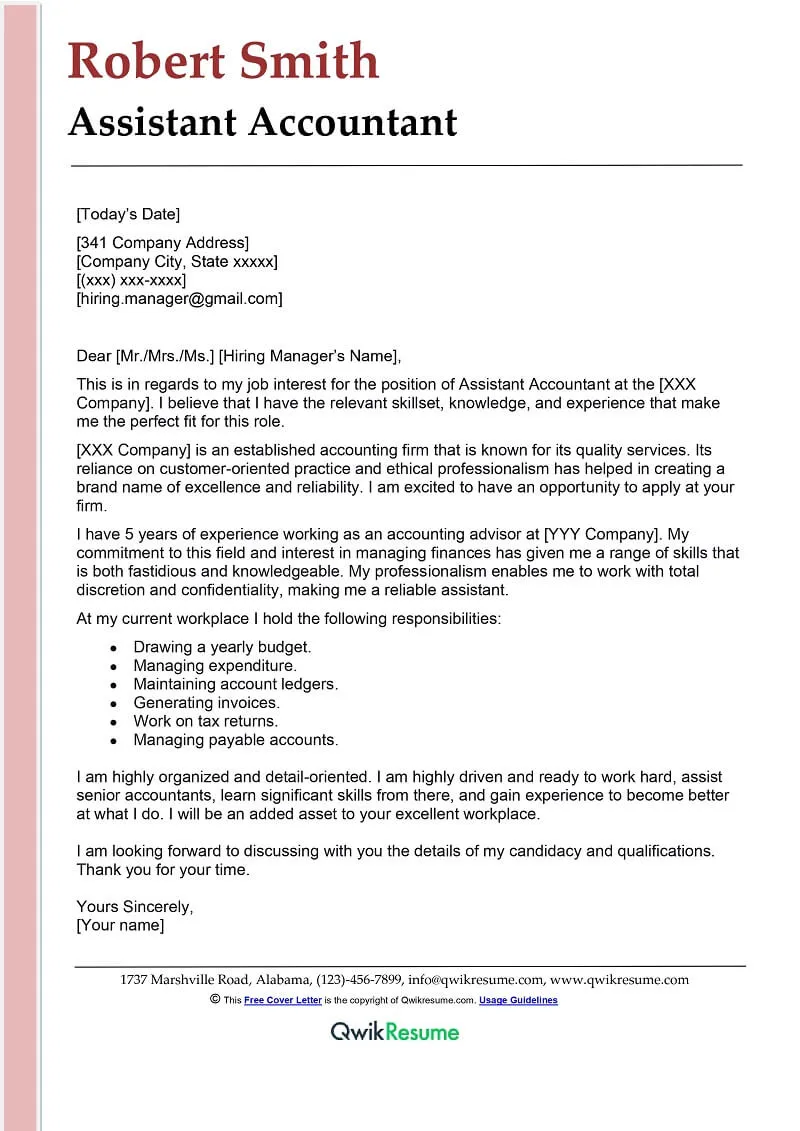What is an Accountant Assistant Cover Letter?
An Accountant Assistant Cover Letter is a crucial document that accompanies your resume when applying for an Accountant Assistant position. It serves as your introduction to a potential employer and provides an opportunity to showcase your relevant skills, experience, and enthusiasm for the role. Unlike your resume, which provides a summary of your qualifications, a cover letter allows you to personalize your application and demonstrate how your specific abilities align with the job requirements and the company’s values. A well-crafted cover letter can significantly increase your chances of getting noticed and securing an interview. It’s your chance to make a strong first impression and differentiate yourself from other candidates. Think of it as a sales pitch, highlighting your unique selling points and convincing the hiring manager that you are the best fit for the position.
Why is a Cover Letter Important?
In today’s competitive job market, a cover letter is more than just a formality; it’s a critical tool for job seekers. It provides a platform to explain your career aspirations, elaborate on your qualifications, and express your genuine interest in the company. A well-written cover letter shows that you’ve taken the time to understand the specific requirements of the role and tailor your application accordingly. It allows you to highlight achievements that might not be evident in your resume and to address any potential gaps or concerns. Furthermore, a cover letter showcases your communication skills, which are essential in accounting. A cover letter is also a good way to inject some personality into your application, making you more memorable to the hiring manager. By taking the time to write a personalized cover letter, you demonstrate your commitment and professionalism, increasing your chances of moving forward in the hiring process.
Highlight Your Relevant Skills and Experience
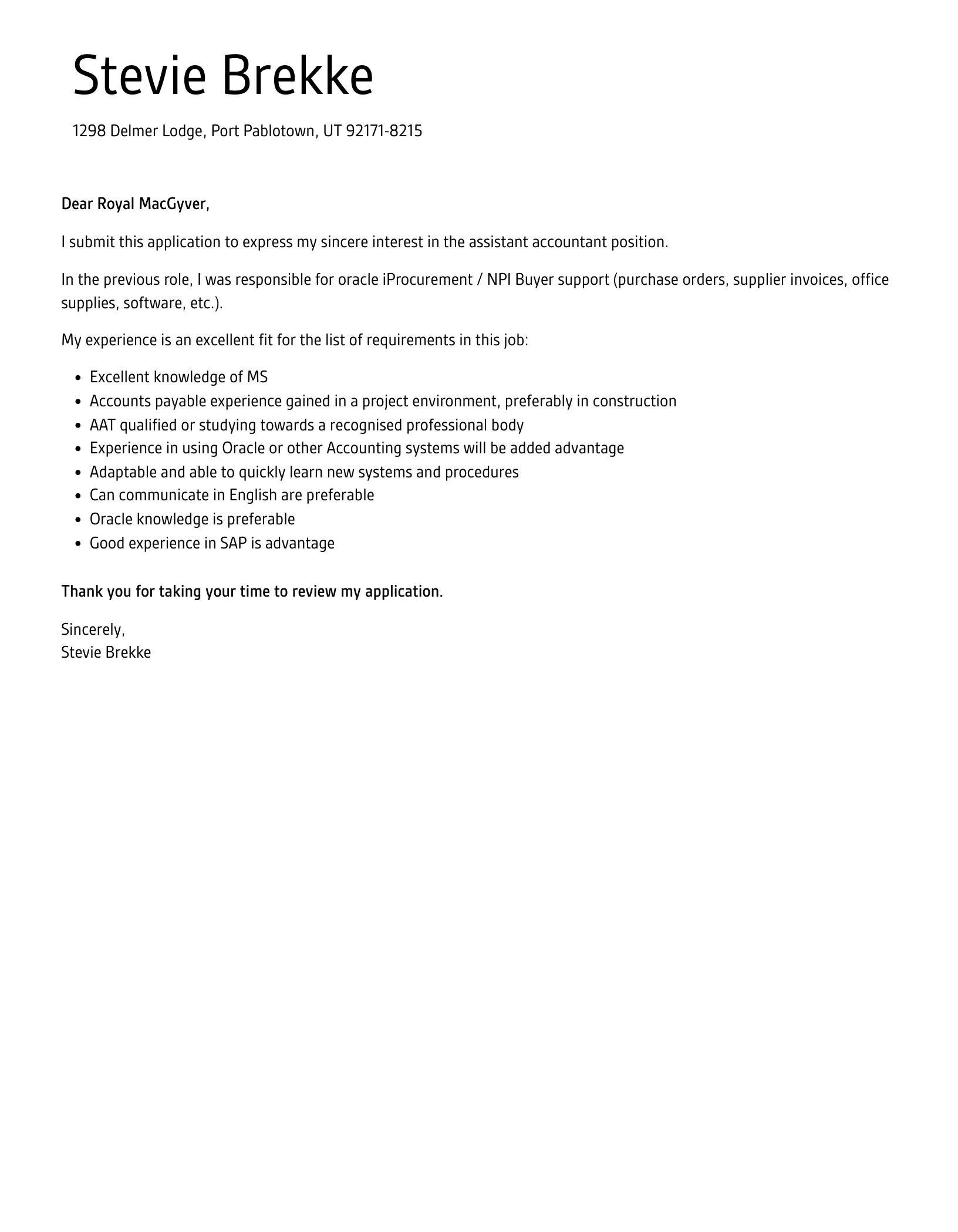
When writing your Accountant Assistant Cover Letter, focus on the skills and experience that are most relevant to the job description. Start by carefully reviewing the job posting and identifying the key requirements and qualifications the employer is seeking. Then, highlight your experiences and accomplishments that align with those requirements. For example, if the job description emphasizes experience with accounts payable and receivable, make sure to include examples of your work in these areas, quantifying your achievements whenever possible. Did you streamline a process that improved efficiency? Did you successfully manage a high volume of transactions? Providing specific examples of your accomplishments will make your cover letter more compelling and demonstrate your ability to deliver results. Tailor your language to reflect the terminology used in the job posting, and avoid simply repeating the information found in your resume; instead, provide more context and detail.
Accounting Software Proficiency
Proficiency in accounting software is a highly sought-after skill for Accountant Assistants. Many companies rely on specific software packages to manage their financial operations, so demonstrating experience with these tools can give you a significant advantage. In your cover letter, be sure to mention any accounting software you’re familiar with, such as QuickBooks, SAP, Oracle, or Xero. If the job posting specifies certain software, make sure to highlight your experience with those specific platforms. Describe the types of tasks you’ve performed using the software, such as data entry, report generation, or reconciliation. If you’ve received any certifications or training related to the software, be sure to mention those as well. Even if your experience is limited, showing a willingness to learn new software and adapt to different systems can demonstrate your adaptability and commitment to the role. Include how the software helped your previous employer.
Communication and Interpersonal Abilities
Effective communication is essential for Accountant Assistants, as they often interact with colleagues, clients, and vendors. In your cover letter, highlight your communication skills by providing examples of how you’ve effectively communicated financial information, resolved conflicts, or collaborated with others. Mention your ability to write clear and concise emails, prepare professional reports, and present information to both technical and non-technical audiences. Also mention your experience in working with a team. Highlight interpersonal skills such as active listening, empathy, and the ability to build rapport. Showcase your ability to work collaboratively and to manage your time effectively. Demonstrate your experience with clients and vendors by mentioning tasks completed for them. If you’ve managed a team before, mention that experience too.
Attention to Detail and Accuracy
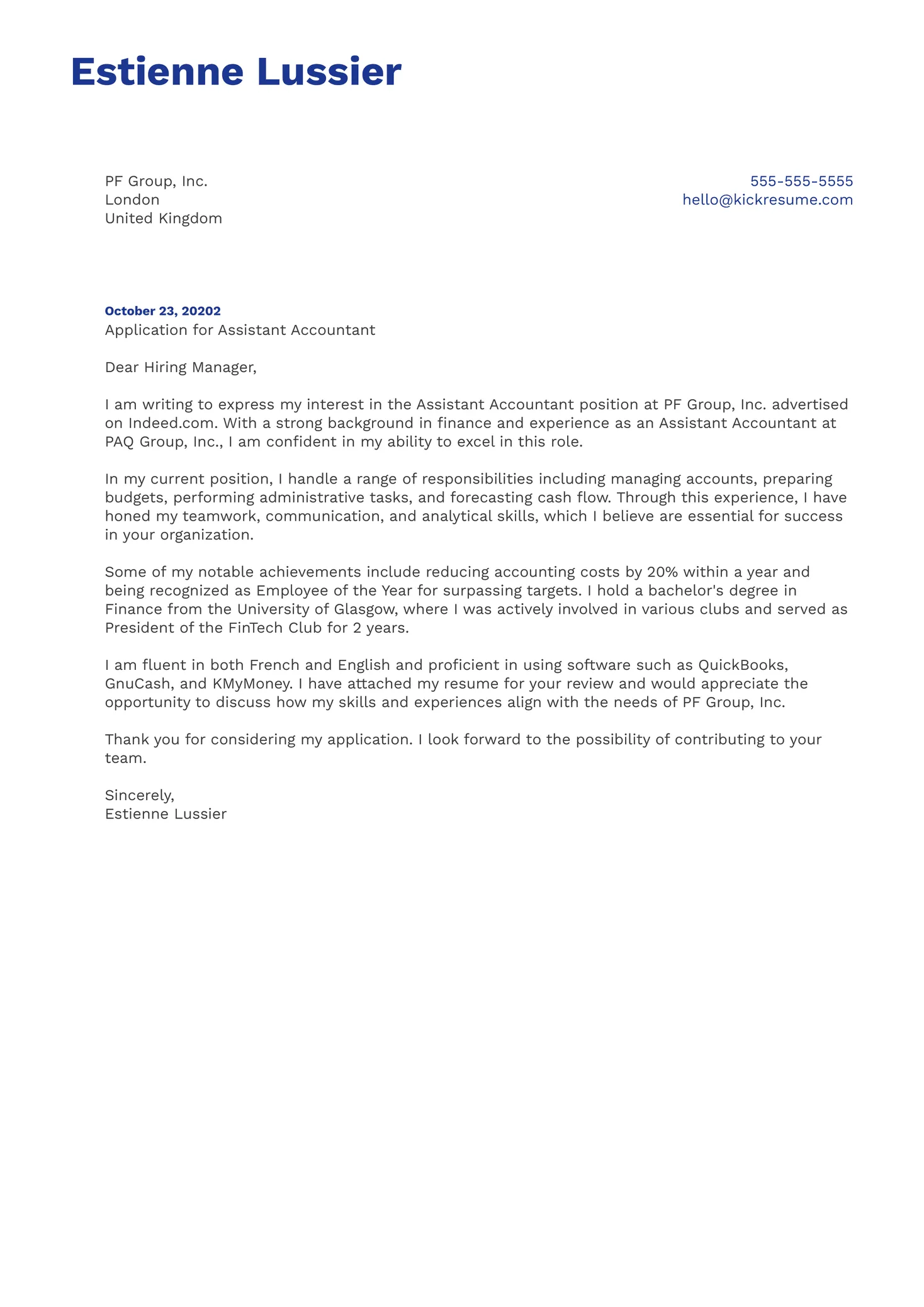
Accountant Assistants must possess a high level of attention to detail and accuracy, as their work directly impacts the financial integrity of a company. In your cover letter, emphasize your ability to meticulously review financial data, identify and correct errors, and ensure compliance with accounting principles. Provide examples of how you’ve demonstrated accuracy in your previous roles, such as reconciling accounts, preparing financial statements, or processing transactions. Mention any systems or processes you’ve used to ensure accuracy, such as double-checking your work or using automated tools. Describe how you’ve addressed and resolved any discrepancies or errors that you’ve encountered. Also, be sure to mention experience in other fields of accounting like tax or auditing. If you have any qualifications in these fields, do mention those.
Tailoring Your Cover Letter to the Job
Generic cover letters are unlikely to make a strong impression on hiring managers. To increase your chances of success, it’s essential to tailor your cover letter to each specific job application. This involves carefully reviewing the job description and identifying the key requirements, skills, and qualifications the employer is seeking. Then, highlight your relevant experience and accomplishments, demonstrating how you meet those specific requirements. Use the language from the job description in your cover letter and address any specific needs or challenges mentioned in the posting. Research the company and demonstrate your understanding of its mission, values, and culture. Show the hiring manager that you’ve taken the time to understand their organization and that you’re genuinely interested in the role. Proofread your cover letter carefully to ensure there are no errors or typos.
Research the Company and Job Description
Before writing your cover letter, dedicate time to researching the company and understanding the job description. This will help you tailor your cover letter to the specific needs of the employer and demonstrate your genuine interest in the role. Visit the company’s website to learn about its mission, values, products, and services. Review the job description carefully, paying attention to the specific responsibilities, required skills, and qualifications. Identify the key phrases and keywords used in the job posting, and incorporate them into your cover letter where appropriate. Consider researching the company’s recent news, projects, and initiatives to show your familiarity with the organization. By demonstrating your knowledge of the company and the role, you’ll make a more compelling case for why you’re a good fit.
Key Phrases to Incorporate
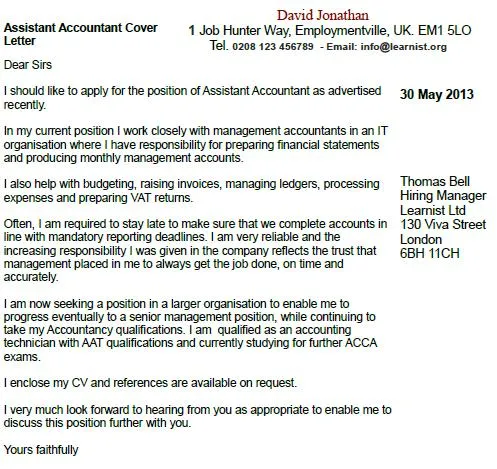
To make your Accountant Assistant Cover Letter more effective, incorporate key phrases that highlight your skills, experience, and enthusiasm. Start by reviewing the job description and identifying the keywords and phrases that are most important to the employer. Use action verbs to describe your accomplishments, such as ‘managed,’ ‘analyzed,’ ‘prepared,’ ‘reconciled,’ and ‘streamlined.’ Quantify your achievements whenever possible, providing specific numbers and data to demonstrate the impact of your work. For example, instead of saying ‘improved efficiency,’ say ‘improved efficiency by 15%.’ Also, use industry-specific terminology, such as ‘accounts payable,’ ‘accounts receivable,’ ‘general ledger,’ and ‘financial statements.’ Demonstrate your understanding of accounting principles and best practices. Use the company’s name and job title in your cover letter to personalize it and show that you’ve taken the time to tailor your application. Always proofread your cover letter to ensure there are no grammatical errors.
Structuring Your Accountant Assistant Cover Letter
A well-structured cover letter is easy to read and makes a positive impression on the hiring manager. Your Accountant Assistant Cover Letter should typically follow a standard format, including a header with your contact information, a professional greeting, an introductory paragraph, body paragraphs highlighting your skills and experience, a closing paragraph, and a call to action. Use a clear and concise writing style, with short paragraphs and bullet points to break up the text and make it more visually appealing. Use a professional font and formatting, such as Times New Roman or Arial, and 1-inch margins. Ensure your cover letter is the appropriate length, typically one page. Proofread your cover letter carefully to ensure there are no errors in grammar, spelling, or punctuation. Make sure it’s easy to read, and it is well organized for an effective approach to the recruiter.
Header and Contact Information
The header of your Accountant Assistant Cover Letter should include your contact information, such as your name, address, phone number, and email address. Make sure your contact information is up-to-date and accurate. Include the date you’re writing the cover letter. Include the hiring manager’s name and title if you know it, and the company’s address. Using the proper format shows professionalism and attention to detail. Ensure your email address is professional and suitable for business correspondence. If you’re applying online, consider including a link to your LinkedIn profile or online portfolio. Your address and phone number is important as the recruiter needs to reach you easily.
Professional Greeting
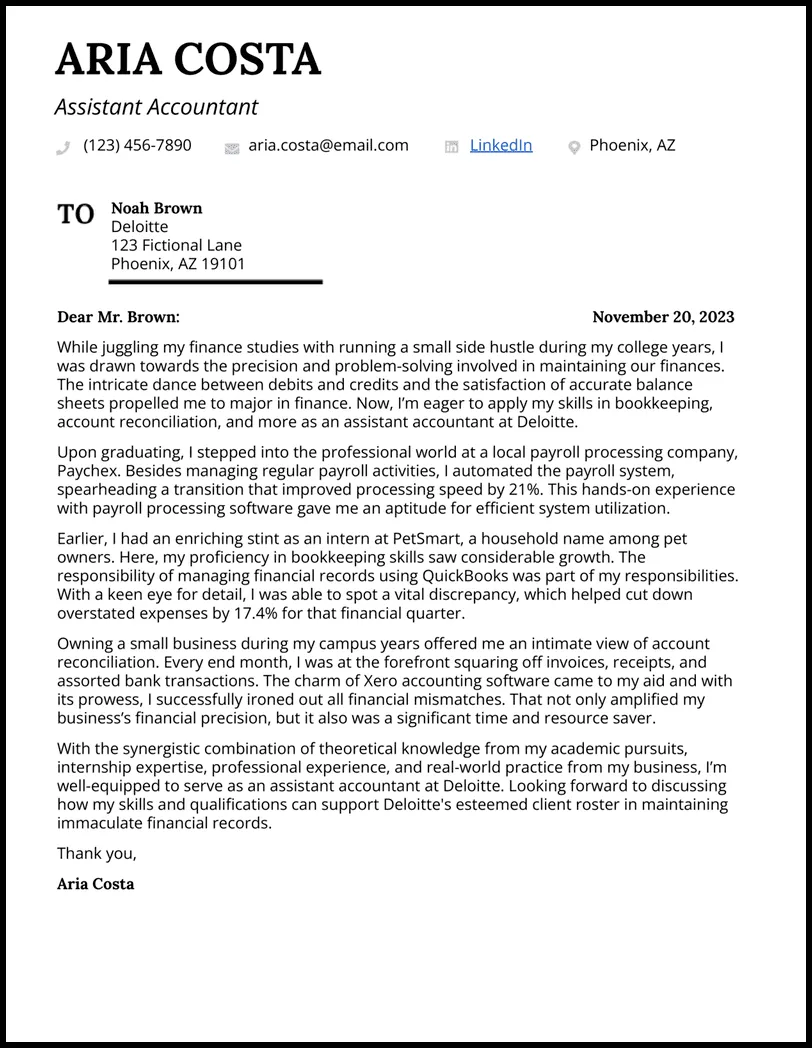
Start your cover letter with a professional greeting. If you know the hiring manager’s name, use it. For example, “Dear Mr./Ms. [Last Name].” If you don’t know the hiring manager’s name, use a general greeting such as “Dear Hiring Manager” or “Dear [Company Name] Hiring Team.” Avoid overly casual greetings, such as “Hi” or “Hello.” Make sure to spell the hiring manager’s name correctly and double-check the title and company name. Using a personalized greeting shows that you’ve taken the time to research the company and that you care about the application. Make sure you know the right person to reach out and use the correct title. It also shows that you care about your application.
First Paragraph Grab Their Attention
The first paragraph of your cover letter is your opportunity to grab the reader’s attention and make a strong first impression. Start by stating the position you’re applying for and where you found the job posting. Briefly introduce yourself and express your interest in the role and the company. Mention something specific that attracted you to the position or the company, such as a particular project or achievement. Briefly summarize your most relevant skills and experience, highlighting any key qualifications that align with the job requirements. Make your first paragraph concise and engaging, and avoid generic opening lines. Your goal is to immediately capture the reader’s interest and encourage them to continue reading. You want to show the recruiter that you are the perfect fit for the role.
Body Paragraphs Highlight Your Skills
The body paragraphs of your Accountant Assistant Cover Letter are where you showcase your skills, experience, and accomplishments. Use these paragraphs to elaborate on your key qualifications and provide specific examples of your work. Organize your body paragraphs logically, focusing on the most relevant skills and experiences. Use action verbs to describe your accomplishments and quantify your achievements whenever possible. For example, instead of saying ‘managed accounts payable,’ say ‘managed accounts payable, processing an average of 150 invoices per week with 99% accuracy.’ Tailor your language to reflect the terminology used in the job description. Provide specific examples of how you’ve used your skills to solve problems, improve processes, or contribute to a team’s success. Demonstrate your understanding of accounting principles and best practices, and mention any relevant certifications or training you’ve received. Keep each paragraph concise and focused, and make sure each one has an effective point. For each point, give a clear example.
Closing Paragraph and Call to Action
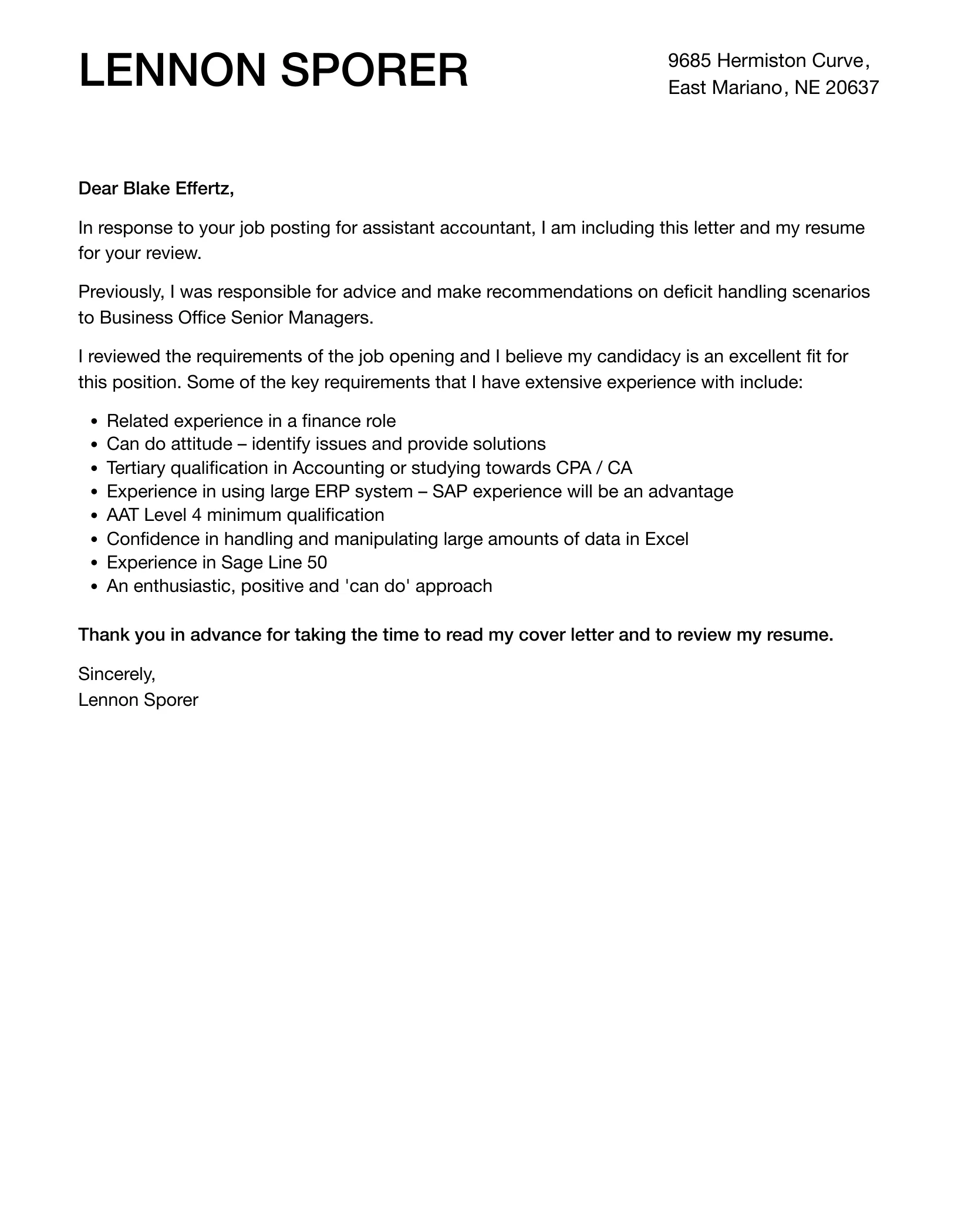
Your closing paragraph should reiterate your interest in the position and thank the hiring manager for their time and consideration. Reiterate the fact that you are the perfect candidate. Summarize your key qualifications and reiterate your enthusiasm for the role and the company. Express your willingness to discuss your qualifications further in an interview. End with a call to action, such as ‘I look forward to hearing from you soon’ or ‘Thank you for your time and consideration.’ Include your contact information again. Use a professional closing, such as ‘Sincerely’ or ‘Best regards,’ followed by your full name. Proofread your entire cover letter to ensure there are no errors or typos.
Proofreading and Formatting Your Cover Letter
Before submitting your Accountant Assistant Cover Letter, take the time to proofread it carefully. Look for any errors in grammar, spelling, punctuation, and formatting. Use a spell checker and grammar checker, but don’t rely on them entirely. Read your cover letter aloud to catch any awkward phrasing or unclear sentences. Ask a friend or family member to review your cover letter and provide feedback. Ensure your cover letter is well-formatted and easy to read. Use a professional font, such as Times New Roman or Arial, and use a consistent font size. Use 1-inch margins and double-space between paragraphs. Make sure your cover letter is the appropriate length, typically one page. Ensure your cover letter is free from any mistakes before submitting it.
